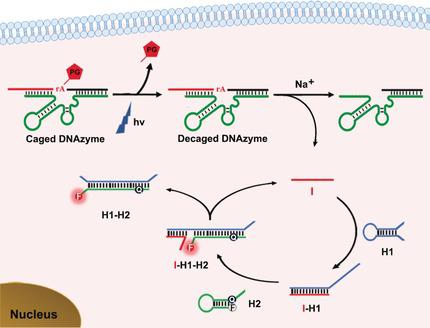当前位置:
X-MOL 学术
›
Angew. Chem. Int. Ed.
›
论文详情
Our official English website, www.x-mol.net, welcomes your
feedback! (Note: you will need to create a separate account there.)
Imaging Endogenous Metal Ions in Living Cells Using a DNAzyme–Catalytic Hairpin Assembly Probe
Angewandte Chemie International Edition ( IF 16.1 ) Pub Date : 2017-06-23 , DOI: 10.1002/anie.201703540 Zhenkun Wu 1, 2 , Huanhuan Fan 1, 2 , Nitya Sai Reddy Satyavolu 2 , WenJing Wang 2, 3 , Ryan Lake 2 , Jian-Hui Jiang 1 , Yi Lu 2
Angewandte Chemie International Edition ( IF 16.1 ) Pub Date : 2017-06-23 , DOI: 10.1002/anie.201703540 Zhenkun Wu 1, 2 , Huanhuan Fan 1, 2 , Nitya Sai Reddy Satyavolu 2 , WenJing Wang 2, 3 , Ryan Lake 2 , Jian-Hui Jiang 1 , Yi Lu 2
Affiliation

|
DNAzymes are a promising platform for metal ion detection, and a few DNAzyme‐based sensors have been reported to detect metal ions inside cells. However, these methods required an influx of metal ions to increase their concentrations for detection. To address this major issue, the design of a catalytic hairpin assembly (CHA) reaction to amplify the signal from photocaged Na+‐specific DNAzyme to detect endogenous Na+ inside cells is reported. Upon light activation and in the presence of Na+, the NaA43 DNAzyme cleaves its substrate strand and releases a product strand, which becomes an initiator that trigger the subsequent CHA amplification reaction. This strategy allows detection of endogenous Na+ inside cells, which has been demonstrated by both fluorescent imaging of individual cells and flow cytometry of the whole cell population. This method can be generally applied to detect other endogenous metal ions and thus contribute to deeper understanding of the role of metal ions in biological systems.
中文翻译:

使用 DNAzyme 催化发夹组装探针对活细胞中的内源金属离子进行成像
DNAzyme 是一种很有前景的金属离子检测平台,据报道,一些基于 DNAzyme 的传感器可以检测细胞内的金属离子。然而,这些方法需要金属离子的流入以增加其浓度以进行检测。为了解决这个主要问题,报道了催化发夹组装(CHA)反应的设计,以放大来自光笼Na +特异性DNA酶的信号,以检测细胞内的内源性Na + 。在光激活和 Na +存在的情况下,NaA43 DNAzyme 裂解其底物链并释放产物链,该产物链成为触发后续 CHA 扩增反应的引发剂。该策略允许检测细胞内的内源性Na + ,这已通过单个细胞的荧光成像和整个细胞群的流式细胞术得到证实。该方法可普遍应用于检测其他内源金属离子,从而有助于更深入地了解金属离子在生物系统中的作用。
更新日期:2017-06-23
中文翻译:

使用 DNAzyme 催化发夹组装探针对活细胞中的内源金属离子进行成像
DNAzyme 是一种很有前景的金属离子检测平台,据报道,一些基于 DNAzyme 的传感器可以检测细胞内的金属离子。然而,这些方法需要金属离子的流入以增加其浓度以进行检测。为了解决这个主要问题,报道了催化发夹组装(CHA)反应的设计,以放大来自光笼Na +特异性DNA酶的信号,以检测细胞内的内源性Na + 。在光激活和 Na +存在的情况下,NaA43 DNAzyme 裂解其底物链并释放产物链,该产物链成为触发后续 CHA 扩增反应的引发剂。该策略允许检测细胞内的内源性Na + ,这已通过单个细胞的荧光成像和整个细胞群的流式细胞术得到证实。该方法可普遍应用于检测其他内源金属离子,从而有助于更深入地了解金属离子在生物系统中的作用。




















































 京公网安备 11010802027423号
京公网安备 11010802027423号